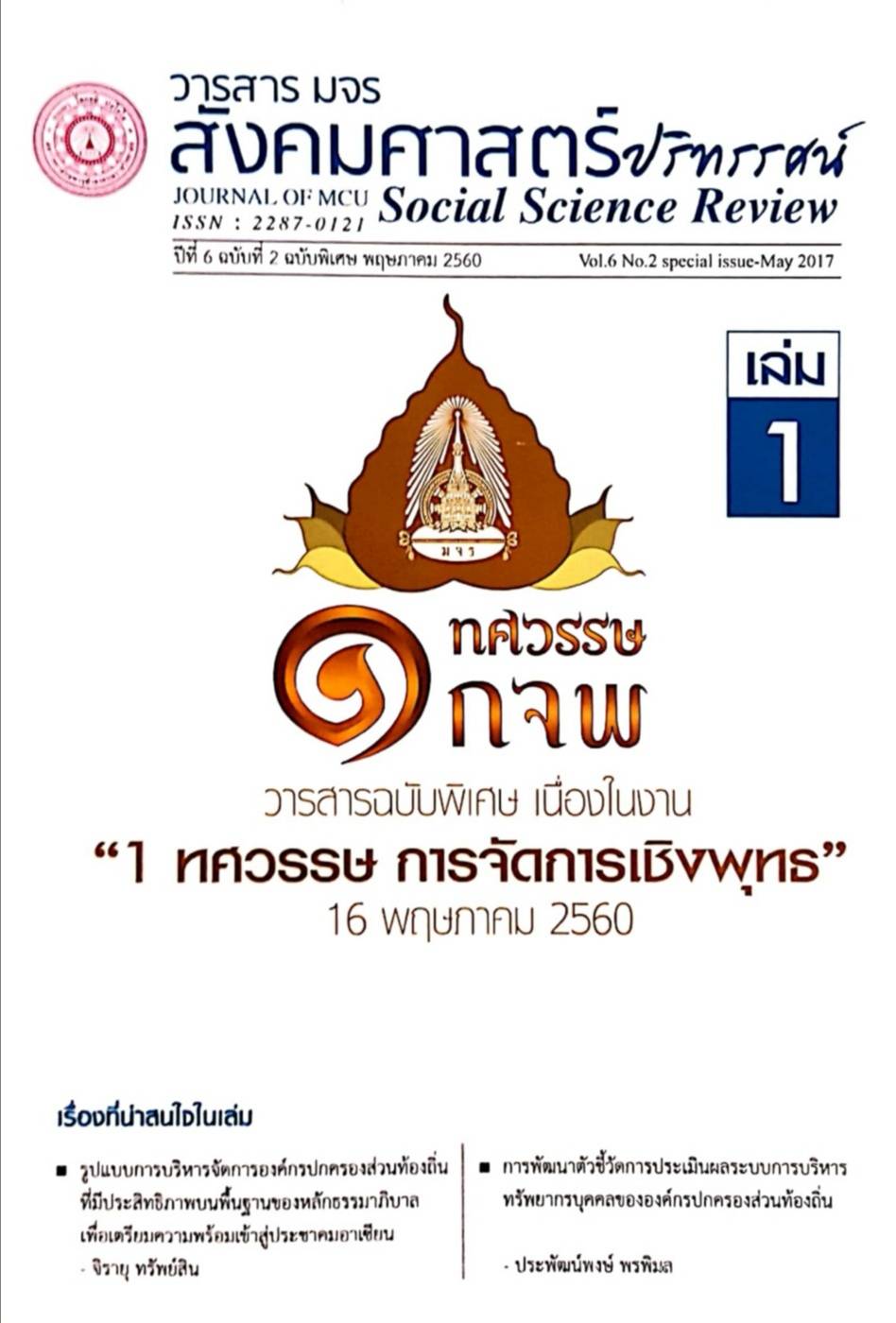การประยุกต์ใช้หลักไตรสิกขาในการพัฒนาพฤติกรรมด้านคุณธรรมจริยธรรมนิสิตที่ พึ่งประสงค์ ของหน่วยวิทยบริการ ณ วัดพระบรมธาตุ จังหวัดกำแพงเพชร
บทคัดย่อ
การศึกษาเรื่อง “การประยุกต์ใช้หลักไตรสิกขาในการพัฒนาพฤติกรรมด้านคุณธรรม
จริยธรรมนิสิตที่พึ่งประสงค์ ของหน่วยวิทยบริการฯ ณ วัดพระบรมธาตุ จังหวัดกาแพงเพชร” มี
วัตถุประสงค์ เพื่อศึกษาการประยุกต์ใช้หลักไตรสิกขาในการพัฒนาพฤติกรรมด้านคุณธรรมจริยธรรม
นิสิตที่พึ่งประสงค์ เพื่อศึกษาเปรียบเทียบการประยุกต์ใช้หลักไตรสิกขาในการพัฒนาพฤติกรรมด้าน
คุณธรรมจริยธรรมนิสิตที่พึ่งประสงค์ และเพื่อศึกษาปัญหาอุปสรรคและข้อเสนอแนะในการ
ประยุกต์ใช้หลักไตรสิกขาในการพัฒนาพฤติกรรมด้านคุณธรรมจริยธรรมนิสิตที่พึ่งประสงค์
การดาเนินการวิจัยโดยวิธีวิจัยเชิงสารวจ (Survey Research) ผู้วิจัยวิเคราะห์ข้อมูล
จากแบบสอบถามโดยใช้โปรแกรมสาเร็จรูปเพื่อการวิจัยทางสังคมศาสตร์ โดยใช้สถิติในการวิเคราะห์
ข้อมูล คือ ค่าความถี่ (Frequency), ค่าร้อยละ (Percentage), ค่าเฉลี่ย (Mean) และค่าเบี่ยงเบน
มาตรฐาน (Standard Deviation) การทดสอบค่าที (t-test) ในกรณีตัวแปรต้นสองกลุ่ม และ
การทดสอบค่าเอฟ (F-Test) ด้วยวิธีการวิเคราะห์ความแปรปรวนทางเดียว (One Way ANOVA)
ในกรณีตัวแปรต้นตั้งแต่สามกลุ่มขึ้นไป เมื่อพบว่ามีความแตกต่างจะทาการเปรียบเทียบความ
แตกต่างรายคู่ด้วยวิธีการของเชฟเฟ่ (Scheff’) โดยกาหนดระดับนัยสาคัญทางสถิติที่ระดับ .05
ผลการศึกษาวิจัยพบว่า
1) จากข้อมูลผู้ตอบแบบสอบถามจานวน 154 คน พบว่าผู้ตอบแบบสอบถามส่วนใหญ่
เป็นเพศชายคิดเป็นร้อยละ 53.25 ด้านอายุส่วนใหญ่มีอายุอยู่ในช่วง 21 – 30 ปีคิดเป็นร้อยละ
45.45 ด้านสถานภาพส่วนใหญ่โสดคิดเป็นร้อยละ 72.73 ด้านระดับการศึกษาส่วนใหญ่อยู่ในระดับ
ปริญญาตรีชั้นปีที่ 1 คิดเป็นร้อยละ 42.86 ด้านรายได้ต่อเดือนส่วนใหญ่ มีรายได้ต่อเดือน ต่ากว่า
5,000 บาทคิดเป็นร้อยละ 45.452) การประยุกต์ใช้หลักไตรสิกขาในการพัฒนาพฤติกรรมด้านคุณธรรมจริยธรรมนิสิตที่
พึ่งประสงค์ของหน่วยวิทยบริการฯ ณ วัดพระบรมธาตุ จังหวัดกาแพงเพชร โดยภาพรวมอยู่ใน
ระดับมาก ( = 4.138) เมื่อพิจารณารายละเอียดในแต่ละด้าน พบว่า อยู่ในระดับมากทุกด้าน
โดยด้านปัญญาสิกขามากที่สุด ( =4.158) รองลงมาเป็นด้านสมาธิสิกขา ( = 4.140) และ
ด้านศีลสิกขา ( = 4.115) ซึ่งแสดงให้เห็นว่านิสิตนักศึกษามีการประยุกต์ใช้หลักไตรสิกขาใน
การพัฒนาพฤติกรรมด้านคุณธรรมจริยธรรมมุ่งเน้นด้านปัญญาและการมีสมาธิในขณะที่ยังมีข้อ
ประพฤติในเรื่องศีลยังน้อยกว่าด้านอื่นๆถึงแม้ว่าอยู่ในระดับมากก็จริง
3) ผลการเปรียบเทียบการประยุกต์ใช้หลักไตรสิกขาในการพัฒนาพฤติกรรมด้าน
คุณธรรมจริยธรรมนิสิตที่พึ่งประสงค์ ของหน่วยวิทยบริการฯ ณ วัดพระบรมธาตุ จังหวัด
กาแพงเพชร โดยจาแนกตามปัจจัยส่วนบุคคล ได้แก่ เพศ อายุ สถานภาพ ระดับการศึกษา และ
รายได้ต่อเดือน ผลการทดสอบสมมติฐาน พบว่า ปัจจัยที่ทาให้เป็นไปตามสมมติฐานที่ตั้งไว้ คือ
ระดับการศึกษา และรายได้ต่อเดือน โดยภาพรวม แตกต่างกัน อย่างมีนัยสาคัญทางสถิติที่ระดับ
.05 ส่วนปัจจัย ด้านเพศ, อายุ และ สถานภาพ โดยภาพรวม ไม่แตกต่างกัน จึงไม่ได้เป็นไปตาม
สมมติฐานที่ตั้งไว้ ซึ่งแสดงให้เห็นว่า ระดับการศึกษา และ รายได้ต่อเดือน ส่งผลก่อให้เกิดการ
ประยุกต์ใช้หลักไตรสิกขาในการพัฒนาพฤติกรรมด้านคุณธรรมจริยธรรมของนิสิตนักศึกษา
4) ปัญหาอุปสรรค การประยุกต์ใช้หลักไตรสิกขาในการพัฒนาพฤติกรรมด้านคุณธรรม
จริยธรรมนิสิตที่พึ่งประสงค์ พบว่า ด้านศีลสิกขา นิสิตนักศึกษาไม่ค่อยเอาใจใส่ในการปฏิบัติเคารพ
ตามกฎระเบียบของมหาวิทยาลัยอย่างเคร่งครัด แสดงประพฤติกรรมต่างๆไม่เหมาะสม ขาดความ
ซื่อสัตย์ซื่อตรงไม่ตรงต่อเวลา พูดจาหยาบคาย ด้านสมาธิสิกขา นิสิตนักศึกษาขาดความอดทนมุ่งมั่น
ขยันหมั่นเพียร ขาดความรับผิดชอบ ขาดความกล้าหาญในการแสดงออกต่างๆ ด้านปัญญาสิกขา
นิสิตนักศึกษามีความคิดเห็น ความเชื่อถือ ทัศนคติ ค่านิยม การแสดงออกต่างๆที่ไม่ดีงามถูกต้อง
การคิดวิเคราะห์ สังเคราะห์ไม่เป็น ขาดใฝ่รู้ใฝ่คิดการค้นคว้าแสวงหาความรู้เพิ่มเติม
5) ข้อเสนอแนะ การประยุกต์ใช้หลักไตรสิกขาในการพัฒนาพฤติกรรมด้านคุณธรรม
จริยธรรมนิสิตที่พึ่งประสงค์ พบว่า ด้านศีลสิกขา มหาวิทยาลัยควรสร้างจิตสานึกค่านิยมเคารพ
กฎหมายระเบียบข้อบังคับของมหาวิทยาลัย ความประพฤติสุจริตทางกายวาจาใจการส่งเสริม
ปลูกฝังสนับสนุนค่านิยมการนาหลักศีลธรรมมาประยุกต์ใช้ในการดาเนินชีวิตประจาวัน ด้านสมาธิ
สิกขา มหาวิทยาลัยควรปลูกฝังฝึกอบรมนิสิตนักศึกษาให้เอาใจใส่อดทนตั้งใจมีความเพียรพยายาม
อดทนมุ่งมั่นความขยันหมั่นเพียร ฝันฝ้าอุปสรรคต่างๆในการศึกษาเล่าเรียน มีความกล้าหาญมี
กตัญญูรู้บุญคุณ มีจิตใจเมตตา กรุณาโอบอ้อมอารีมีน้าใจต่อกัน ด้านปัญญาสิกขา มหาวิทยาลัยควร
ส่งเสริมให้นิสิตนักศึกษามีความคิดเห็น ความเชื่อถือ ทัศนคติ ค่านิยมต่างๆที่ดีงาม มีความดาริตริ
ตรองพิจารณาอย่างรอบคอบ มีความเสียสละหวังดีมีไมตรี สร้างทักษะความรู้ และอุปนิสัยใน
การศึกษาเรียนรู้ที่ดี ใฝ่รู้ใฝ่คิด มีความกระตือรือร้นสนใจค้นคว้าแสวงหาความรู้
เอกสารอ้างอิง
พุทธ เพื่อสะท้อนแนวคิดปรัชญาเศรษฐกิจพอเพียง ในบริบทแห่งสังคมไทยยุค
ปัจจุบัน”รายงานการวิจัย. สาขาวิชาการประถมศึกษา : คณะศึกษาศาสตร์
มหาวิทยาลัยศรีนครีนทรวิโรฒ.
ธานินทร์ ศิลป์จารุ. (2551). การวิจัยและวิเคราะห์ข้อมูลทางสถิติด้วย SPSS. นนทบุรี : บริษัท เอส
อาร์ พริ้นติ้ง แมสโปรดักส์ จากัด.
บุษกร วัฒนบุตร. (พฤษภาคม - สิงหาคม 2559). “การบริหารจัดการองค์กรเพื่อการสร้างองค์กร
แห่งการเรียนรู้บนฐานแห่งพุทธิปัญญา”.วารสาร มจร สังคมศาสตร์ปริทรรศน์. 5 (2).
บุญมี แท่นแก้ว. (2539). จริยศาสตร์. กรุงเทพฯ : โอเดียนสโตร์.
ประเวศ วะสี. (2547). ธรรมชาติของสรรพสิ่ง: การเข้าถึงความจริงทั้งหมด. กรุงเทพฯ : โรงพิมพ์
มูลนิธิสดศรี-สฤษดิ์วงศ์.
พระธรรมปิฎก (ป.อ. ปยุตโต). (2545). รุ่งอรุณของการศึกษา เบิกฟ้าแห่งการพัฒนาที่ยั่งยืน.
กรุงเทพฯ : โรงพิมพ์สหธรรมิก จากัด.
พระพรหมคุณาภรณ์ (ป. อ. ปยุตฺโต). (2550). สามไตร. กรุงเทพฯ: บริษัท พิมพ์สวย จากัด.
มหาวิทยาลัยมหาจุฬาลงกรณราชวิทยาลัย. (2557). คู่มือนิสิต หลักสูตรพุทธศาสตรมหาบัณฑิต
สาขาวิชาการบริหารการศึกษา หลักสูตรพุทธศาสตรดุษฎีบัณฑิต สาขาวิชาพุทธบริหาร
การศึกษา. กรุงเทพมหานคร : มหาจุฬาลงกรณราชวิทยาลัย.
สมเด็จกรมพระยาดารงราชานุภาพ. (2516). จามเทวีวงศ์ พงศาวดารเมืองหริภุญไชย. พระนคร :
ห้างหุ้นส่วนจากัดบรรณกิจเทรดดิ้ง.
สิน พันธุ์พินิจ. (2547). เทคนิคการวิจัยทางสังคมศาสตร์, กรุงเทพฯ : บริษัทจูนพับลิชชิ่ง จากัด.
เอกสารวิชาการ. (2539). หลักการบริหารและการจัดการวัดในยุคโลกาภิวัตน์. กรุงเทพฯ : มูลนิธิซิ
เมนต์ไทย
นายทวีศักดิ์ ทองทิพย์. (2555). “การวิเคราะห์การศึกษาตามหลักไตรสิกขา”. วิทยานิพนธ์พุทธ
ศาสตรดุษฎีบัณฑิต. บัณฑิตวิทยาลัย : มหาวิทยาลัยมหาจุฬาลงกรณราชวิทยาลัย.
สุขสันต์ จันทะโชโต.(มกราคม – เมษายน 2559).ปัจจัยที่มีผลต้อการดาเนินชีวิตตามวิถีสังคมชาว
พุทธ : กรณีศึกษาการดาเนินชีวิต ตามหลักพุทธศาสนาของชุมชนในเขตเทศบาลเมือง
ลพบุรี จังหวัดลพบุรี วารสาร มจร สังคมศาสตร์ปริทรรศน์, 5 (1).
. โสวิทย์ บารุงภักดิ์, ชยันต์ บุญพิโย และ สมชัย ศรีนอก.(2551). “พฤติกรรมความเชื่อของ
ประชาชนในวรรณกรรมเรื่องสังข์ศิลป์ชัย”. รายงานการวิจัย. ขอนแก่น: มหาวิทยาลัย
มหาจุฬาลงกรณราชวิทยาลัย วิทยาเขตขอนแก่น.
ดาวน์โหลด
เผยแพร่แล้ว
รูปแบบการอ้างอิง
ฉบับ
ประเภทบทความ
สัญญาอนุญาต
ลิขสิทธิ์ (c) 2020 วารสาร มจร สังคมศาสตร์ปริทรรศน์

อนุญาตภายใต้เงื่อนไข Creative Commons Attribution-NonCommercial-NoDerivatives 4.0 International License.
เพื่อให้เป็นไปตามกฎหมายลิขสิทธิ์ ผู้นิพนธ์ทุกท่านต้องลงลายมือชื่อในแบบฟอร์มใบมอบลิขสิทธิ์บทความให้แก่วารสารฯ พร้อมกับบทความต้นฉบับที่ได้แก้ไขครั้งสุดท้าย นอกจากนี้ ผู้นิพนธ์ทุกท่านต้องยืนยันว่าบทความต้นฉบับที่ส่งมาตีพิมพ์นั้น ได้ส่งมาตีพิมพ์เฉพาะในวารสาร มจร สังคมศาสตร์ปริทรรศน์ เพียงแห่งเดียวเท่านั้น หากมีการใช้ภาพหรือตารางหรือเนื้อหาอื่นๆ ของผู้นิพนธ์อื่นที่ปรากฏในสิ่งตีพิมพ์อื่นมาแล้ว ผู้นิพนธ์ต้องขออนุญาตเจ้าของลิขสิทธิ์ก่อน พร้อมทั้งแสดงหนังสือที่ได้รับการยินยอมต่อบรรณาธิการ ก่อนที่บทความจะได้รับการตีพิมพ์ หากไม่เป็นไปตามข้อกำหนดเบื้องต้น ทางวารสารจะถอดบทความของท่านออกโดยไม่มีข้อยกเว้นใดๆ ทั้งสิ้น





